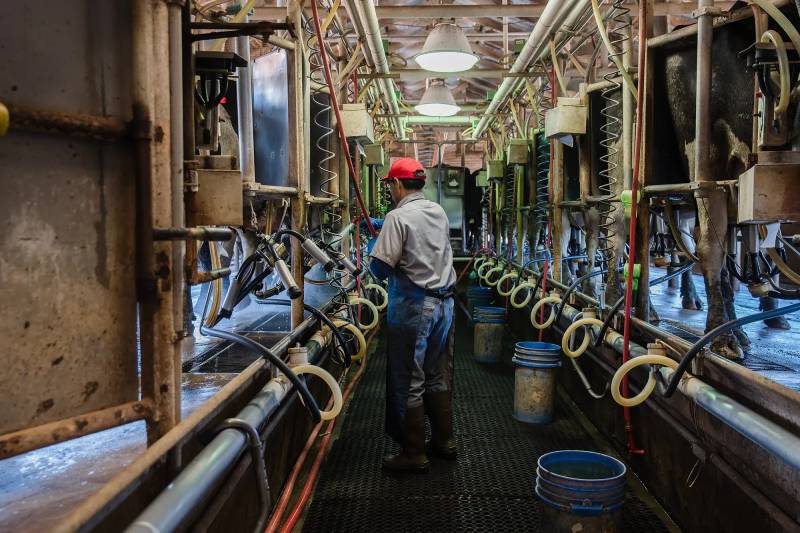The current bird flu surveillance strategy places the majority of the responsibility on farmers to self-report disease among animals and employees, which is problematic, said Elizabeth Strater, a spokesperson for United Farm Workers.
“Workers are actively avoiding testing, I can assure you,” Strater said. “We have heard directly from farmworker communities and veterinarians that they can see that there are workers out there who are sick.”
Workers, who often have low income, can’t afford the 10-day isolation period with no pay if they are positive, Strater said.
Millions of poultry have been slaughtered since the virus first took hold in California farms two years ago, and this year, the highly transmissible virus jumped to cattle, posing a new threat to those who work with the animals.
Authorities have confirmed bird flu infections at 178 California dairies since it first emerged in August, according to the state Department of Food and Agriculture, and there is no sign of infections among cows slowing. The transmission from cows to humans is thought to occur through close and prolonged contact with sick animals.
“The most concerning data we have is how little data we have,” Strater said. “Hundreds of herds have tested positive, and the number of people tested is in the dozens — that’s a problem.”
Dr. Erica Pan, chief epidemiologist with the state health department, said about 20 to 30 people are screened weekly for various influenza variants, including bird flu, in the course of routine flu monitoring.
The difference between testing for bird flu and COVID-19, which requires widespread surveillance, Pan said, is that the eye needs to be swabbed, which must be done by a clinician.
“This is about looking for symptoms and then testing for them instead of testing people without symptoms,” Pan said.
California distributes PPE for bird flu
The state and local health departments are focusing on distributing protective gear and educating workers on how to use it, Pan said. More than 3.3 million pieces of PPE have been distributed to local health departments and farms, according to the state health department.
The state also deployed 5,000 doses of seasonal flu vaccine for farm workers. Although that vaccine won’t protect against bird flu, it reduces the chances of a severe coinfection.
Last week, KFF Health News reported that farmers in other states have refused to cooperate with local health departments and disease investigators.
Tricia Stever Blattler, executive director of the Tulare County Farm Bureau, said she has not heard of any instances of local employers refusing to cooperate with authorities.
Tulare County, the nation’s largest milk producer, has been the epicenter of the outbreak among cattle and dairy workers, reporting the state’s first human cases in early October. Cases have since been reported in surrounding counties.
Early in October, when temperatures soared above 100 degrees, it was difficult to get workers to don additional protective equipment, said Stever Blattler, but that concern has abated with cooling temperatures.
Dairies surprised by bird flu
The severity of the disease for cattle and its rapid spread among herds caught the industry off-guard, Stever Blattler said, and has had “a huge economic ripple.”
“Our dairies are really trying to fast-track their learning on the situation,” Stever Blattler said. “They’re trying to create an appropriate and safe workplace, and they’re also trying to increase the care and monitoring of the cattle itself.”

